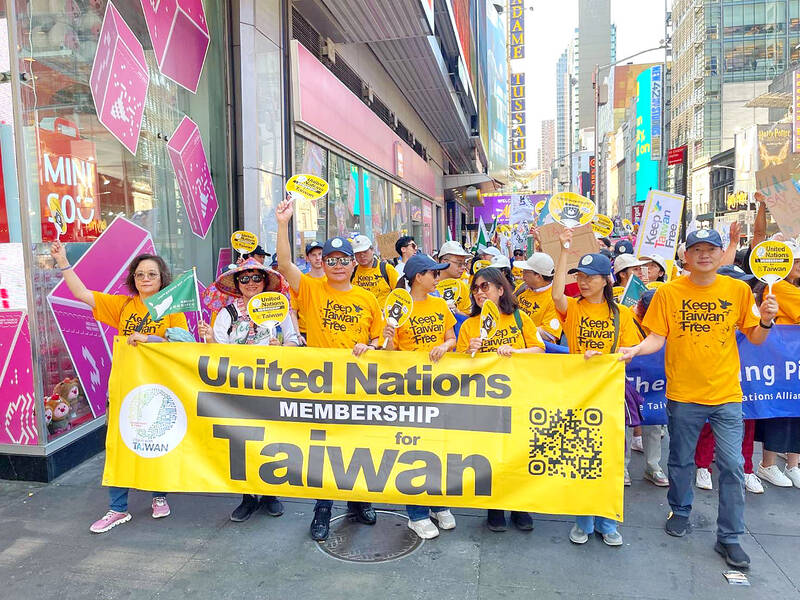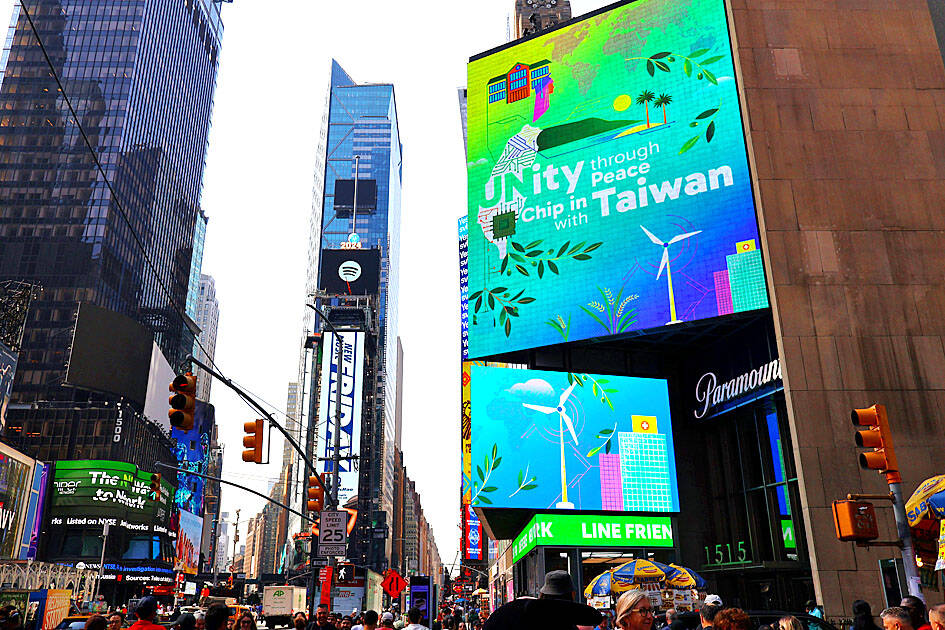More than 500 people on Saturday marched in New York in support of Taiwan’s entry to the UN, significantly more people than previous years.
The march, coinciding with the ongoing 79th session of the UN General Assembly, comes close on the heels of growing international discourse regarding the meaning of UN Resolution 2758.
Resolution 2758, adopted by the UN General Assembly in 1971, recognizes the People’s Republic of China (PRC) as the “only lawful representative of China.” It resulted in the Republic of China (ROC) losing its seat at the UN to the PRC. Taiwan has since been excluded from participating in the international organization and its affiliates.

Photo courtesy of Taiwan People’s Party Legislator Wu Chun-cheng’s office
Saturday’s rally attracted many young Taiwanese expats as well as international students, and event-organizers said that more than 500 people participated in the event, more than in the past few years.
Last year, about 300 people took part in the event, while the number was about 250 in 2022.
Participants gathered on Saturday afternoon in front of the Consulate General of the People’s Republic of China in midtown Manhattan to join the March for Taiwan, under the theme of “United and Marching Forward, Supporting Taiwan’s Entry into the UN.”

Photo courtesy of Taipei Economic and Cultural Office in New York via CNA
The march was led by Democratic Progressive Party Legislator Ngalim Tiunn (張雅琳) and Taiwan People’s Party Legislator Wu Chun-cheng (吳春城) and crossed midtown to end at the New York Public Library.
Participants distributed flyers and materials advocating for Taiwan’s entry to the UN, and chanted slogans such as “Keep Taiwan Free” and “UN for Taiwan.”
The 79th UN General Assembly opened on Tuesday last week under the theme of “Leaving no one behind: Acting together for the advancement of peace, sustainable development and human dignity for present and future generations.”
Taipei Economic and Cultural Office in New York Director Tom Lee (李志強) said the primary task in this year’s march was to help the international community correctly understand the content of Resolution 2758 and call on the international body to include Taiwan’s contribution to its sustainable development goals.
“It is important for the international community to understand that China’s interpretation of Resolution 2758 does not equate to the real 2758 and has no bearing on Taiwan’s status,” Lee said, adding that the goal is for Taiwan to engage with the UN fairly and appropriately.
After reaching the New York Public Library, Taiwanese lawmakers participating in the event from across the political spectrum expressed thanks to those who joined the march, reiterated their support for Taiwan’s UN inclusion and emphasized the need for unity.
Taiwan’s diplomatic approach on the world stage needs to be unified and nuanced, and the government should work with the overseas Taiwanese community, Chinese Nationalist Party (KMT) Legislator Wu Tsung-hsien (吳宗憲) said.
The visiting legislators also engaged in activities with officials from Paraguay and Tuvalu, diplomatic allies of Taiwan.
Resolution 2758 provides Taiwan an opportunity for more meaningful participation in UN affairs and greater welfare for its people, Tiunn said.
On Saturday, there were also advertisements and billboards in Times Square about the nation’s UN bid and tourism.
Earlier this month, the Australian parliament passed a motion stating that the resolution does not prohibit Taiwan’s participation in international organizations, nor does it affirm China’s sovereignty over Taiwan.
Meanwhile, the Dutch House of Representatives on Thursday passed a resolution stating that Resolution 2758 does not involve Taiwan, making it the first parliamentary body in Europe to approve such a motion.

CHAOS: Iranians took to the streets playing celebratory music after reports of Khamenei’s death on Saturday, while mourners also gathered in Tehran yesterday Iranian Supreme Leader Ayatollah Ali Khamenei was killed in a major attack on Iran launched by Israel and the US, throwing the future of the Islamic republic into doubt and raising the risk of regional instability. Iranian state television and the state-run IRNA news agency announced the 86-year-old’s death early yesterday. US President Donald Trump said it gave Iranians their “greatest chance” to “take back” their country. The announcements came after a joint US and Israeli aerial bombardment that targeted Iranian military and governmental sites. Trump said the “heavy and pinpoint bombing” would continue through the week or as long

TRUST: The KMT said it respected the US’ timing and considerations, and hoped it would continue to honor its commitments to helping Taiwan bolster its defenses and deterrence US President Donald Trump is delaying a multibillion-dollar arms sale to Taiwan to ensure his visit to Beijing is successful, a New York Times report said. The weapons sales package has stalled in the US Department of State, the report said, citing US officials it did not identify. The White House has told agencies not to push forward ahead of Trump’s meeting with Chinese President Xi Jinping (習近平), it said. The two last month held a phone call to discuss trade and geopolitical flashpoints ahead of the summit. Xi raised the Taiwan issue and urged the US to handle arms sales to

BIG SPENDERS: Foreign investors bought the most Taiwan equities since 2005, signaling confidence that an AI boom would continue to benefit chipmakers Taiwan Semiconductor Manufacturing Co’s (TSMC, 台積電) market capitalization swelled to US$2 trillion for the first time following a 4.25 percent rally in its American depositary receipts (ADR) overnight, putting the world’s biggest contract chipmaker sixth on the list of the world’s biggest companies by market capitalization, just behind Amazon.com Inc. The site CompaniesMarketcap.com ranked TSMC ahead of Saudi Aramco and Meta Platforms Inc. The Taiwanese company’s ADRs on Tuesday surged to US$385.75 on the New York Stock Exchange, as strong demand for artificial intelligence (AI) applications led to chip supply constraints and boost revenue growth to record-breaking levels. Each TSMC ADR represents

Pro-democracy media tycoon Jimmy Lai’s (黎智英) fraud conviction and prison sentence were yesterday overturned by a Hong Kong court, in a surprise legal decision that comes soon after Lai was jailed for 20 years on a separate national security charge. Judges Jeremy Poon (潘兆初), Anthea Pang (彭寶琴) and Derek Pang (彭偉昌) said in the judgement that they allowed the appeal from Lai, and another defendant in the case, to proceed, as a lower court judge had “erred.” “The Court of Appeal gave them leave to appeal against their conviction, allowed their appeals, quashed the convictions and set aside the sentences,” the judges